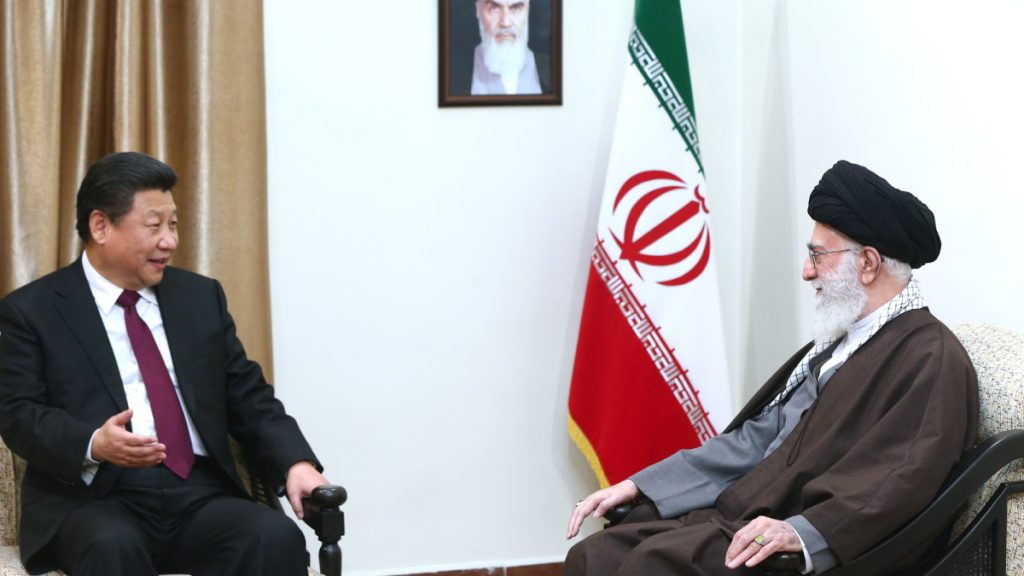Could Iran and China be on the verge of downgrading their diplomatic relations?
Despite Iran and China signing a 25-year cooperation agreement in 2021, Chinese President Xi Jinping’s December visit to Saudi Arabia caused a stir in Tehran. This visit was part of a broader outreach mission that China was conducting with Gulf Arab states, where issues of trade and national security were discussed.
It’s no secret that Saudi Arabia and China have solid relations. Since 2020, Saudi Arabia has been China’s top crude oil supplier and the two countries enjoy a total of $87.3 billion in bilateral trade. What perturbs Iran isn’t so much the Saudi’s cozy economic relationship with China, but a joint statement that China and the GCC nations recently signed.
This joint statement sharply criticized Iran for its “nuclear file in destabilizing regional activities” and Iran’s alleged backing of local terrorist organizations. On top of that, the statement accused Iran of supplying ballistic missiles and drones to proxies across the region. The irony here is that the accusation of regional destabilization talking point levied against Iran almost reads word-for-word with criticism that United States neoconservative and pro-Zionist elements in the national security state use against it.
What’s more, the joint statement brought up the issue of three islands situated in the Strait of Hormuz— Abu Musa, Greater Tunb, and Lesser Tunb. These islands fall under Iran’s jurisdiction but the United Arab Emirates claims them. The statement read as follows: “The leaders affirmed their support for all peaceful efforts, including the initiative and endeavors of the United Arab Emirates, to reach a peaceful solution.”
Iran’s Foreign Minister Hossein Amir Abdollahian immediately tweeted in response to China’s surprising joint statement with Gulf Arab states. He stressed that the three islands are “inseparable parts of the pure land of Iran and belong to this motherland forever. In the necessity of respecting the territorial integrity of Iran, we have no complacency with any side.”
Mohammad Jamshidi, Deputy Chief of Staff for Political Affairs , took exception with the accusation that Iran is a sponsor of terrorism, sounding off in a tweet: “Chinese colleagues should remember that when Saudi Arabia and America supported ISIS and Al-Qaeda terrorist groups in Syria and destroyed Yemen with brutal military aggression, it was Iran that fought the terrorists to establish stability and security in the region.”
Iranian authorities were so perturbed that on December 10, 2022, they called to hold a meeting with the Chinese ambassador to Iran Chang Hua to address this issue. Chinese authorities immediately took note and the Chinese Ministry of Foreign Affairs tried to immediately rectify the situation. In due time, Chang issued a statement that read, “China decisively supports Iran against foreign intervention and for preserving its national sovereignty, territorial integrity, and national dignity”.
While this tense diplomatic moment has appeared to have subsided, there is increased speculation that China is slowly discarding its policy of neutrality and starting to side more with the Saudis. In many respects, China’s drift towards Saudi Arabia reflects the new geopolitical realities in the Middle East. For one, the US no longer holds as strong of a military presence in the region as it’s shifting more of its resources towards the Indo-Pacific region to directly contain China. In effect, China is starting to fill in the vacuum that the US has left behind. Moreover, US-Saudi relations have deteriorated in recent years thanks to the Biden administration’s stronger focus on human rights as a principal standard for determining the US’s relations with countries. The US, above all its corporate media, has for the past few years made a major stink about the assassination of Saudi-American journalist Jamaal Khashoggi, who many believe was assassinated by the Saudi government.
Curiously, China has taken a relatively pro-Saudi stance with regards to the Yemeni Civil War, where it has stressed the importance of maintaining Yemen’s territorial integrity and governmental stability. In a roundabout way, China and the US are of the same mind on the Yemeni conflict. Iran, on the other hand, has been accused of supplying weapons to the Houthi rebels, who are of Zaydi Shia confession, in an effort to give its primary Islamic rival in Saudi Arabia a bloody nose.
While Iran and China are largely on the same page when it comes to opposing US hegemony and interference in their respective domestic affairs, there are some limitations to their relationship. Given Iran’s increased military cooperation with Russia, especially on the drone supply front in the Russo-Ukrainian conflict, and recent reports that Russia was Iran’s largest foreign investor in the last 15 months, it appears that Russia is shaping up to be Iran’s most reliable ally at this juncture.
All things considered, Iran will have to recognize that geopolitics is a cold-blooded enterprise where there are no permanent friendships, but rather permanent intrigues motivated by national interests. It has largely picked up on this reality as evidenced by its recent decision to strengthen ties with Russia. Such juggling acts will become fixtures of the new multipolar order that’s taking root on the international stage.
To say that multipolarity will be marked by volatility on all fronts would be the understatement of the century.
